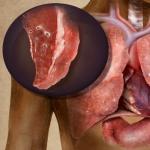general description| What's this? For whom?
Certification in in electronic format carried out using FGIS "Mercury".
The main function of the system "Mercury"– maintenance of internal electronic certification of all types of cargo, tracking the path of their movement through the territory Russian Federation, improving biological and food safety. Many years ago, the Food and Agriculture Organization of the United Nations and the International Epizootic Bureau proclaimed a simple and understandable principle for every participant in the trade turnover - control of the production chain from “field to counter”. In accordance with this principle, it is necessary to implement solutions at all stages of the supply chain that make it possible to determine the origin, location, route of the product or batch of products. Efficient system traceability should allow products to be traced down or up the supply chain. To do this, the Mercury system records information about all stages of production: raising animals, slaughtering them, places of storage and processing of the resulting products, and so on up to retail sales. At each stage, a separate certificate is issued - in this way a chain of electronic documents is built, according to which you can find out everything about the product. Mercury makes the whole process absolutely transparent and consistent. Each stage of its movement is taken into account. Unscrupulous Entrepreneur simply will not be able to sell products that do not meet quality and safety standards. And even more so counterfeit or smuggling.
Each subsequent certificate is associated with the previous one (or with the previous ones, if there were several) and subsequent ones. Mercury exchanges information both with Argus, that is, it “knows” where this cargo or raw materials for its production were imported from (if the raw materials or products were imported to Russia), and with Vesta, that is, it “knows” , for what and with what indicators he (it) was investigated. Moreover, it “knows” along the entire chain - from the animal to finished products. This is the complete traceability system.
Basic concepts
- VSD- these abbreviations are used to designate a veterinary document - a veterinary certificate (VC) or a veterinary accompanying document (VSD). The following abbreviations can also be used - EVSD, VS, EVS.
- Production batch of controlled goods- any quantity of controlled goods, except for animals, produced within one or several days, to which, in accordance with the requirements (if any) of the legislation of the country where this product is produced, the manufacturer has assigned batch identifiers (identifiers) - batch or series number, date ( date range) of production, control number (if applicable), shelf life (if applicable), expiration date (if applicable), or any number of mammals intended for use in one place for one purpose, or aquatic animals intended for human consumption, or intended for breeding in order to obtain products intended for food by people belonging to the same biological species, who were kept in the same livestock enterprise (including private household plots and peasant farms) or in private household plots (peasant farms) located in the same locality, or any number of non-mammalian animals of one or more biological species intended for use in one place with one purpose, which were kept in one livestock enterprise (including private household plots and peasant farms) or in small farms (peasant farms) located in the same locality .* Production VSD- a veterinary document issued for a production batch of controlled goods.
- Supervised object (site)- the place where the economic entity carries out its activities. In the general case, an economic entity may not be the owner of the site, but may be a tenant, for example. There are 4 types of sites available in the system:
- Company;
- Market;
- SBBZH;
- Vessel.
- Cancellation of the veterinary certificate- the procedure for changing the status of a previously issued veterinary certificate, carried out by the person who issued this certificate, or by a person authorized to conduct veterinary supervision, or GIS Mercury, in connection with the successful completion of the implementation of the process for which the certificate was issued
- Business entity is a person who independently organizes his activities and bears full responsibility for the risk arising from his activities. Within the framework of FSIS "Mercury", an economic entity is a participant in the economy that carries out supervised activities. There are 3 types of business entities available in the system:
- Entity;
- Individual;
- Individual entrepreneur / peasant farm.
- Transport lot of controlled goods- any quantity of controlled goods of the same name belonging to one production batch, moved in one vehicle to the address of one recipient or a new owner (if the movement is made simultaneously with the transfer of ownership), or any quantity of controlled goods of the same name belonging to one production batch, transferred during one transaction to one owner and at the same time not moved and located in the same room during the transaction ( cold store), or any number of animals belonging to one production batch, transferred without moving them during one transaction to one owner, or transported in one vehicle or simultaneously driven as part of one herd (herd, flocks, etc.) to one address , or any number of animals of the same biological species, grown (kept) to obtain products from them intended for food for people who were kept in the same livestock enterprise (including household plots and peasant farms) or in household plots (peasant farms) located in the same locality, transferred without their movement during one transaction to one owner, or transported in one vehicle or simultaneously driven as part of one herd (herd, flock, etc.) to one address, or any number of indoor (aquarium, terrarium, etc.) ) animals belonging to one or more species kept in one place or obtained in nature in one locality, simultaneously transported in one vehicle to one address, or transferred to one new owner without moving them, or any number of circus or sports or service animals belonging to one or more biological species, contained in one place, simultaneously transported in one vehicle or several vehicles, following the same route at the same time, to the same address, or transferred to one new owner without moving them.
- Transport VSD- a veterinary certificate issued for a transport consignment of controlled goods.
- Gateway- a set of web services that allows you to send requests from the commodity accounting systems of economic entities to the FSIS "Mercury", bypassing the web interface. Same as Vetis.API.
Transition period
By order of the Ministry of Agriculture No. 589 dated December 27, 2016, a transitional period for the introduction of electronic certification is established.
Until January 1, 2018 registration of veterinary accompanying documents for controlled goods is carried out on paper or in electronic form at the request of the owner of these controlled goods. That is, the choice between electronic and paper certification is made by cargo owners.
From January 1, 2018 registration of veterinary accompanying documents is carried out only in electronic form. It is important to note that until January 1, 2018, registration of veterinary accompanying documents for controlled goods, for which no veterinary accompanying documents were issued before the date of entry into force of this Federal Law, is not made or is made in electronic form at the request of the owner of these regulated goods.
Connection procedure | How to connect?
Connection options
To start working with FSIS "Mercury", it is necessary to determine the method of interaction with the system:
- using the system web interface;
- by integrating your accounting system with FSIS Mercury through the Vetis.API integration gateway.
Web interface
Work via the web interface means that to get started, no additional software not installed on workstation. All you need is any modern web browser. This is the cheapest (nothing to purchase) and fastest (2 weeks to get started) way to get started with eCertification.
At the same time, the web interface has a number of limitations, since it involves the work of the operator to enter information for issuing a certificate. FSIS "Mercury" has built-in various mechanisms for automating the work of specialists who process VSD, based on the use of data import, forms for filling out documents, etc. As a result, labor costs are significantly reduced in comparison with the execution of the VSD on paper.
The results of our continuous monitoring of the issue of VSD show that now the most active users, using the web interface, issue on average from 400 to 2400 electronic VVD per day. This amount is quite suitable for small or medium manufacturing enterprise or warehouse, but does not correspond to the scope of certification for a large enterprise. In this case, it is advisable to use the mechanisms provided by the Vetis.API integration gateway.
Integration gateway Vetis.API
Work through the integration gateway means that to get started, you need to develop yourself or purchase a client integration module. Our practice shows that the scope of work on the development and implementation of an integration solution by the company's own specialists can be from 3 to 4 months with the involvement of 1-2 specialists and does not require significant financial investments. In order to effectively implement electronic veterinary certification, the Rosselkhoznadzor has concluded agreements on cooperation with leading IT companies 1C, Startup-Fabrik ( mobile solutions), Korus Consulting is an authorized partner of SAP. Upon completion of the integration project, 1C and SAP systems client companies will receive their turnkey solutions with an integrated module for interaction with the FGIS "Mercury". For example, participants in the turnover calculated that for an average processing enterprise with 17 types of products in its assortment, it is necessary to issue 2210 VSD daily. Now, for example, "Ravis-poultry farm Sosnovskaya", using "Vetis.API", issues daily an average of 20 thousand electronic VVD with the help of 1 veterinarian per shift.
Obtaining access to FSIS Mercury
According to the Order of the Ministry of Agriculture of the Russian Federation of December 27, 2016 No. 589, registration in the Mercury system is carried out as follows:
- Individual entrepreneur has the right to send an application on paper by mail to the address of the Rosselkhoznadzor or one of its Territorial Administrations or in electronic form to the email address of the Rosselkhoznadzor: [email protected] signed by an individual entrepreneur simple digital signature. Please note that statements without EDS are not considered.
- Organization entitled to submit an application to writing on the letterhead of the organization signed by its head (deputy head) to the Rosselkhoznadzor or one of its Territorial departments, or in the form electronic document, certified enhanced qualified electronic signature organization or its head (deputy head), sent to e-mail [email protected] Please note that statements without UECP are not considered.
Connection Application Template
- template for an application for granting access for individual entrepreneurs (IP).
- template for an application for granting access for legal entities (LE)
Connection to Vetis.API
In the case of developing an integration module, you need to get access to Vetis. API.
- Access to Vetis.API is provided in 2 stages: the first stage is the application for access to the test version (Example of an application for connection to the test version of Vetis.API) Vetis.API for development and debugging, the second stage is the application for access to productive version of Vetis.API.
- Access to the test version of Vetis.API for developing and debugging client modules is provided at the request of business entities and authorities state power subjects of the Russian Federation in the field of veterinary medicine.
- The application is drawn up on the letterhead of the organization with the signature of the head (or a person authorized by him) and the seal of the organization and is submitted to the FGBI "ARRIAH" by e-mail to the address [email protected].
- The application must contain the following data:
- Name and details (Legal address; TIN; OGRN) of the business entity or organization responsible for making requests to Vetis.API.
- Contact person (or contacts) for technical and organizational issues (name, place of work, e-mail address, telephone).
- The name of the connected software system (platform) that makes requests.
- List of business entities served by the software system (name of organization, legal address, TIN, OGRN). They are filled in if more than one enterprise works through the information system, but several (for example, a dairy plant and a meat processing plant can be connected through the holding system). Consent of the listed business entities to the processing of their data in VetIS.
- Access details to the test version of Vetis.API (access details are sent to the personal e-mail address of the contact person).
- Details of access to the web interface of the test version of the gateway of subsystems Mercury.GVE, Argus.VU.
- The ability to use the test version of Vetis.API in accordance with the assigned role and the specified "Service Area".
- Upon completion of the development and testing of the client module, the organization or institution independently determines its readiness for the transition to the productive version of Vetis.API. Readiness is determined based on the following criteria:
- Operations for issuing VVD and other operations implemented from information system organizations or institutions, do not disrupt internal business processes and do not delay production or logistics operations.
- All operations necessary for the organization or institution have been tested and tested to a sufficient extent: the registration of the VSD from the information system was carried out within a period of at least 10 working days in real production process.
- During the testing period in the real production process, the number of requests with errors with the MERC code should not exceed 10% of the total number of requests of this type per day. There are no bugs with the APL and APLM code during the trial period.
- Access to the productive version is provided only after the client has completed development and debugging in the test version of the gateway and only if the third-party information system and the gateway developed for its integration with FSIS Mercury meet the following requirements:
- When contacted, a third-party information system must be able to transmit data on the unique identifier of the client solution and the developer company, data on the location of the object that this client solution serves, including its unique identification number in the FSIS Cerber registry, the identification data of the user on whose behalf the FSIS Mercury, actions are performed, information about which is provided from the client solution to FSIS Mercury.
- The third party information system must ensure that there are no technical feasibility making changes to the completed certificate, if such a certificate is also stored on remote workstations of a third-party information system.
- If there is reasonable confidence in the readiness to use the productive version of Vetis.API (Example of an application for connection to the productive version of Vetis.API), the organization or institution informs about this by sending an application for access to the productive version of Vetis.API containing the information specified in paragraph 4.
- Registration is carried out by officials of the FGBI "ARRIAH" within a period of not more than 5 working days after receipt of the application.
- After registration, an organization or institution is provided with:
- Access details to the productive version of Vetis.API (access details are sent to the specified e-mail address of the contact person).
- The ability to use the productive version of Vetis.API in accordance with the assigned role and the specified "Service Area".
- Access to the test version of Vetis.API is preserved.
- Registration may be canceled in the following cases.
- If the total number of any errors when performing business operations in the productive version of Vetis.API exceeded 10% of the total number of requests of this type per day. In this case, the organization or institution responsible for issuing requests to the gateway is issued a warning. If the errors are not eliminated within 5 working days, the software system is disconnected from the productive version of Vetis.API for a period of at least 1 month and until the errors are eliminated. During this period, only a test version of Vetis.API is available to an institution or organization.
- To restore access to the productive version of Vetis.API, you must send a corresponding request.
Implementation progress of e-certification
1. On the situation with the introduction of electronic veterinary certification at the end of May 2017: http://www.fsvps.ru/fsvps/news/21437.html
2. On the situation with the introduction of electronic veterinary certification at the end of April 2017: http://www.fsvps.ru/fsvps/news/21048.html
3. On the situation with the introduction of electronic veterinary certification at the end of March 2017: http://www.fsvps.ru/fsvps/news/20723.html
4. On the situation with the introduction of electronic veterinary certification at the end of February 2017: http://www.fsvps.ru/fsvps/news/20722.html
5. On the situation with the introduction of electronic veterinary certification at the end of January 2017: http://www.fsvps.ru/fsvps/news/20067.html
Knowledge base | Useful materials
Regulations
Up-to-date information on regulatory legal acts in the field of electronic certification can be found on the official website of the Rosselkhoznadzor in the section "Electronic veterinary certification".
Normative-legal acts regulating the execution of veterinary accompanying documents.
| No. p / p | Type of NPA | Registration number | Acceptance date | Name | Status |
|---|---|---|---|---|---|
| 1 | the federal law | 243 | July 13, 2015 | On Amendments to the Law of the Russian Federation "On Veterinary Medicine" and Certain Legislative Acts of the Russian Federation | It entered into force |
| 2 | Order of the Ministry of Agriculture of Russia | 589 | December 27, 2016 | On approval of the Veterinary Rules for the organization of work on the preparation of veterinary accompanying documents, the Procedure for issuing veterinary accompanying documents in electronic form and the Procedure for issuing veterinary accompanying documents on paper | It entered into force |
| 3 | Order of the Ministry of Agriculture of Russia | 22 | 01/22/2016 | On approval of the rules for monitoring the veterinary safety of the territory of the Russian Federation" | It entered into force |
| 4 | Order of the Ministry of Agriculture of Russia | 648 | December 18, 2015 | On approval of the list of regulated goods to be accompanied by veterinary accompanying documents | It entered into force |
| 5 | Order of the Ministry of Agriculture of Russia | 647 | December 18, 2015 | On approval of the list of controlled goods for which certified specialists who are not authorized persons of bodies and institutions included in the system of the state veterinary service of the Russian Federation can carry out the execution of veterinary accompanying documents | It entered into force |
| 6 | Order of the Ministry of Agriculture of Russia | 646 | December 18, 2015 | On approval of the list of products of animal origin, for which authorized persons of organizations that are manufacturers of regulated goods and (or) participants in the circulation of regulated goods, and individual entrepreneurs that are manufacturers of regulated goods and (or) participants in the circulation of regulated goods, can issue veterinary accompanying documents | It entered into force |
| 7 | Order of the Ministry of Agriculture of Russia | 635 | December 14, 2015 | On approval of the veterinary rules for the regionalization of the territory of the Russian Federation | It entered into force |
| 8 | Order of the Ministry of Agriculture of Russia | 634 | December 14, 2015 | On the procedure for the appointment of laboratory tests of controlled goods (including catches of aquatic biological resources and products made from them) in order to issue veterinary accompanying documents | It entered into force |
| 9 | 1140 | November 7, 2016 | On approval of the Procedure for the creation, development and operation of the Federal State Information System in the field of veterinary medicine | It entered into force | |
| 10 | Decree of the Government of Russia | 1145 | 11/09/2016 | On approval of the Rules for the certification of specialists in the field of veterinary medicine | It entered into force |
| 11 | Draft Order of the Ministry of Agriculture of Russia | (project) | - | On approval of the procedure for conducting a qualification exam for specialists in the field of veterinary medicine and the application form for attestation of specialists in the field of veterinary medicine | Designed |
| 12 | Solution | - | 01/20/2017 | Decision on establishing the status of the regions of the Russian Federation on contagious animal diseases and the conditions for the movement of goods under the control of the state veterinary supervision | Entered into force |
User instructions
Instructions for working in the Mercury system are collected in the help system https://youtu.be/7xPHayOx8vQ)
Technical documentation for Vetis.API
Instructions for implementing electronic veterinary certification through the Vetis.API integration gateway are available in Help system Rosselkhoznadzor:
Documentation includes:
- description of the procedure for granting access to the pilot (test) and production servers
- general description of the technologies used and interaction schemes
- description of data transfer formats (WSDL, XSD)
- system availability monitoring
Frequently Asked Questions and Answers
Mercury is a state information system for recording electronic veterinary certificates (eVSD). Since 2018, everyone involved in the circulation of goods of animal origin, including retail, is required to work in it. Application forms for registration in Mercury and answers to the main questions about the system are on this page.
How to connect to Mercury?
To register in Mercury, fill out the application form and submit it to the Rosselkhoznadzor:
The application can be submitted to the Rosselkhoznadzor (or its territorial office) on paper or sent by e-mail. Wherein:
- Individual entrepreneurs must certify the application in electronic form with a simple electronic signature and send it to the address [email protected].
- For LLC, other rules: the application is signed by the electronic signature of the head and sent to the address [email protected].
When the application is processed, you will receive an e-mail with the data for entering the Mercury system to the e-mail indicated in it.
Who is required to join and when?
According to the latest amendments to the Federal Law of July 13, 2015 No. 243 “On Amendments to the Law of the Russian Federation “On Veterinary Medicine”, from July 1, 2018, all VSD must be issued electronically through the FSIS Mercury. Thus, before July 1, 2018, everyone whose activities are related to any stage of the circulation of goods of animal origin are required to connect to the system. This applies to all manufacturers and distributors of goods supervised by the State Veterinary Control: retail stores, wholesale depots, dairies and meat processing plants, poultry farms and seafood producers, farms, breeding farms, as well as public catering, retail chains and logistics centers. State veterinarians serving these enterprises must also register.
For which products do you need to issue electronic VSD?
In the Mercury system, it is necessary to take into account all goods subject to veterinary control, namely:
- all types of meat, offal and fats;
- sausages, prepared and canned meat products;
- fish in any form, including canned fish (except for fish fillets and fish meat under heading 0304 of the FEACN);
- pasta stuffed with meat, sausage, fish or seafood;
- crustaceans, molluscs, aquatic invertebrates;
- all types of dairy products;
- butter and other fats and oils made from milk, milk spreads;
- cottage cheese and cheeses, including processed ones;
- bird eggs;
- natural honey;
- yeast is inactive;
- ready-made soups and broths and preparations for their preparation;
- ice cream, except for fruit and berry-based ice cream, fruit and edible ice.
- feed grain: durum and soft wheat, rye, barley, oats, corn;
- propolis, beeswax and waxes of other insects, spermaceti;
- compound feed;
- fertilizers of plant and animal origin;
- raw skins, hunting trophies, stuffed animals.
What should a retail store do in the system?
Within 1 working day from the date of delivery and acceptance, the retail store must pay off the VSD for the transport lot in the system. If you accepted the goods partially, you must indicate the discrepancies when canceling. A refundable VSD will be issued automatically.
Important! If you have received a shipment, but there is no VSD for it in the Mercury system, you cannot accept the goods.
What if we don't have internet? Can I continue to work with paper VSD?
Two options are possible: either you simply have not yet connected to the Internet, or you work in an area where this is not possible.
- In the first case, you cannot use paper VSDs. And since e-certification is mandatory for you from July 1, 2018, you must establish and verify your Internet connection before this date. If you do not want to connect, you can provide access to the system to your authorized representative, who will pay the IRR and make refunds for you. The law does not establish requirements for such a representative: it can be a supplier (if he agrees) or a third-party company.
- In the second case - if you work in an area where there is no access to communications and therefore it is impossible to connect to the Internet - you can continue to work with paper VSDs.
Be careful! The list of places where there is no Internet access point is approved by the subjects of the federation.
Is it possible to delay the launch of the Mercury system?
The launch of the Mercury system has already been postponed: from January 1, 2018, it was postponed to July 1, 2018. Until that day, the registration of electronic VSD is not necessary, but counting on a further delay after July 1, 2018 is wrong and dangerous for retail: then in the first days of July, those who did not have time to register will no longer be able to send and receive goods.
There is still time until July 1, but we recommend not postponing the transition to electronic certification. It will take some time to process your application for registration in the Mercury system. And then you need to learn more complex system get used to working in it and, possibly, train employees. Therefore, it is important to register as soon as possible. Do not put it off until the last day - fill it out and send it to Rosselkhoznadzor right now.
Will there be fines?
The penalty for non-compliance with the requirements of the Federal Law of July 13, 2015 No. 243 is provided for by Art. 10.8 of the Code of Administrative Offenses. So, if a car with a cargo controlled by the State Veterinary Supervision Service is stopped for inspection, the forwarder will have to provide information about the eVSD: QR codes or unique UUID identifiers (the main requisite of the electronic VVD), which can be checked in the public service of the Mercury system. In the absence of VVD, a fine will be imposed: from 3000 rubles. per driver or from 10,000 to 20,000 rubles. on the entity, according to Art. 10.8 of the Code of Administrative Offenses. For a legal entity, the suspension of activities for up to 90 days can also become a measure of responsibility.
From January 1, 2018, all goods controlled by Rosselkhoznadzor will have to undergo mandatory electronic certification in the Federal State Information System "Mercury" in accordance with Federal Law No. 243 of July 13, 2015 "On Amendments to the Law of the Russian Federation "On Veterinary Medicine"".
What is FGIS "Mercury"
The Federal State Information System "Mercury" is part of the Federal State Information System in the field of veterinary VetIS and is managed by the Federal Service for Veterinary and Phytosanitary Supervision - Rosselkhoznadzor.
Before the beginning next year veterinary certification can be carried out through paper veterinary accompanying documents. From the beginning of 2018, paper certificates will be replaced by electronic ones. Companies involved in the circulation of goods of animal origin will be required to enter each stage of production and movement of products into the system via the Internet.
The use of "Mercury" has undeniable advantages for both market participants and consumers - the system will make it possible to control the entire sequence of product movement, which will ensure consumer protection from counterfeit goods and promote fair competition among manufacturers. The cost of supervisory and control procedures will decrease due to the fact that electronic technologies will replace paper forms of veterinary accompanying documents, and due to the fact that highly qualified veterinarians will not be required to create an electronic VVD. The centralized database of the system will reduce the time for generating reports and searching for data on goods - the execution of veterinary documents will be faster and easier.
In turn, for the consumer, the introduction of electronic certification through the Mercury system will mean state guarantee safety of products of animal origin.
The main benefits of using the Mercury system for electronic veterinary certification can be summarized as:
- Traceability- government agencies will be able to determine the origin and route of the goods at any stage of its movement.
- Quality and safety control- in case of detection of deviations from product safety standards, it can be quickly withdrawn from circulation or the sales network.
- Speeding up and reducing the cost of the veterinary certification process- Saving resources will be possible due to the automation of production and circulation processes.
Which products are subject to electronic veterinary certification
Since the beginning of 2018, not only mandatory electronic certification of veterinary products has been introduced, but also the list of products subject to certification has been expanded. An electronic VSD must be issued during the circulation, production, movement, as well as the transfer of ownership of animals and products of animal origin, including dairy and meat products, canned meat, seafood, fats, vegetable oils and other products. Full list goods that must be accompanied by veterinary documents in electronic form, approved by Order of the Ministry of Agriculture of Russia dated December 18, 2015 No. 648.
Features of electronic certification
The Mercury system will help manufacturers and carriers of goods effectively interact with government bodies. Certification of goods involves employees of institutions that are part of the State Veterinary Service of the Russian Federation, authorized employees of business entities involved in the circulation of animals and products of animal origin, as well as certified specialists who are not authorized persons of institutions of the State Veterinary Service of Russia.
Certification in without fail pass meat processing plants, poultry farms, seafood producers, dairies, shops retail, farms, wholesale depots and breeding farms.
Access and work in FSIS "Mercury" is free for all categories of users. To conduct electronic certification, there is no need to contact the state veterinary services - trained employees of companies will be able to independently enter data into the system, which will save time and money.
Each checked product in the system will be assigned a unique number - the identifier of the electronic certificate. Knowing the number of the certificate, it will be possible to obtain data on the product, its origin and movement.
How to join the Mercury system
There are two ways to connect to the Mercury system - through the system's web interface or through the API. To register in the system, it is necessary to provide the Territorial Directorate of Rosselkhoznadzor with data on the company or individual entrepreneur, places of business and information about the company administrator who will work in the system. The application can be submitted in paper or electronic form, after its consideration the subscriber receives a letter with access data and can start working.
All applications in electronic form for connection to the Mercury system must be signed with an EDS. For individual entrepreneurs a simple electronic signature is sufficient, organizations need to obtain an enhanced qualified digital signature.
How to get an electronic signature for FSIS "Mercury"
To get a qualified electronic signature to work in the "Mercury" system, contact the accredited certification center "Infotex Internet Trust". We will issue an EDS for work with Mercury within two working days.
Leave a request on the site and wait for the call of the manager, who will tell you in detail about the procedure for obtaining the service and answer your questions. Next, we will send you an invoice, pay it and prepare documents for verification. Verification is the final step in the procedure for obtaining an electronic signature. You will need to come to one of the offices of our company, the specialist will identify your identity with the help of documents, after which you will receive a certificate and electronic signature keys.
If you urgently need to issue an electronic signature for the Mercury system or for other purposes, use our additional service accelerated receipt of EDS within an hour.
Certain categories of products, according to the law, must undergo mandatory veterinary certification. Based on its results, a paper certificate of conformity of the quality of goods is issued. established standards and requirements. Meanwhile, the issue of transition to electronic veterinary certification. Consider further the pros and cons of the new system.
General information
Federal Service for Veterinary and Phytosanitary Supervision has been planning to replace paper certification with electronic one for a long time. For this, a special Internet application has been developed. It is called GIS "Mercury".
You can open the app directly in your browser and enter the required product information to later receive a certificate.
Together with the GIS "Mercury" other auxiliary systems "Vesta", "Argus", "Cerberus" will be launched. The latter will be used to track and record legally significant transactions. The Vesta system is designed to record the results of laboratory tests. The Argus application is already being used in practice for issuing permits for the import of products.
The Federal Service for Veterinary and Phytosanitary Surveillance suggests that new order will significantly reduce bureaucracy and speed up the issuance of documentation. In addition, interested persons do not have to carry paper certificates with them, it is enough to know the permit number. According to him authorized bodies will be able to check the product type and origin.
Are changes needed?
Many manufacturers wonder why Federal Service on veterinary and phytosanitary supervision it was necessary to change the rules. Actually, such a question is quite logical, since there are many gaps in the current domestic legislation.

In countries carried out to ensure the safety of the population. Laboratory studies are carried out to detect and prevent dangerous diseases. The WTO believes that the certificate is needed solely for protection against infections.
Russian legislation does not specify anywhere why a certificate is needed. Missing and normative act, fixing the list of unreliable suppliers or regions in which the likelihood of epidemics in farm animals is high.
Meanwhile, in Russia there are GOSTs, sanitary and epidemiological rules and requirements, and there is also a Law regulating the sanitary and epidemiological well-being of the population. Accordingly, it is erroneous to say that veterinary certification (electronic or paper) does not make sense.
Web application specifics
It is supposed to work as follows. The user must be logged in to obtain a certificate. This action involves entering information about the batch of goods. If the products are manufactured in the Russian Federation, this data is sufficient. If the goods are foreign-made, it is additionally necessary to have a certificate issued in the country of origin of the goods.
The application not only collects data, but also tracks them. This is necessary so that a new certificate is issued only to confirm the information entered earlier. Thus, cheating the system is problematic.

If an error is detected in the issuance of a certificate, the document can be promptly revoked.
Subsystems
They are especially important for dairy producers. Electronic veterinary certification is provided for imported goods and products moving through the territory of Russia. In the first case, the subsystem "Temporary storage warehouse" is used, in the second - "State veterinary examination".
Meanwhile, GIS is not yet fully formed. In particular, it lacks the modules necessary for entering data on raw materials and products.
At trial implementation developers failed to establish the ability to integrate the application into automated systems dairies. At the same time, as representatives of the National Union of Manufacturers noted, there is an insufficient level of automation in the industry.
Regulatory support
Discussions about the expediency of the introduction, the rules of organization electronic veterinary certification were very lively. In 2014, the Ministry of Agriculture finally issued an order. He approved the procedure for issuing electronic documentation (Order 281).

Electronic Veterinary Certification must be carried out in accordance with the rules provided for in this order. Meanwhile, manufacturers and experts note that the content of the adopted act differs significantly from the draft, which was discussed with the business community. I must say that during these discussions, manufacturers put forward many rational proposals that could prevent the emergence of controversial issues.
Responsibility of processors
Until now, documents in the dairy industry were drawn up exclusively for raw materials. It is expected that it will become mandatory for processors.
The document, in particular, will be needed for milk (including dry milk), cottage cheese, cheese, butter. In such a situation, there is a risk of duplication of functions of two departments - Rosselkhoznadzor and Rospotrebnadzor.
Problems
If speak about pros and cons of electronic veterinary certification, manufacturers and processors still see only shortcomings. But if manufacturers are already familiar with the procedure for obtaining a document, and it will not be difficult for them to switch to an electronic format of interaction with authorities, then processors will have many problems.

Difficulties are associated primarily with the fact that developers electronic veterinary certification did not take into account a number of features of the activities of these subjects.
To obtain a document, processors need to indicate the source of raw materials for each batch. Many of them accept raw materials from several manufacturers. Often, the number of suppliers reaches 100. Many processors, following the instructions of the regional administration, collect raw materials from small farmers. This allows you to support the agricultural industry.
Of course, it is unprofitable to carry a separate tank car for each of the suppliers. Accordingly, at the stage of collecting raw materials, it is mixed. It is simply impossible to indicate the source in the result.
The factories have a lot of batches of products. Even with a small number of suppliers of raw materials, the company will have to collect an impressive number of certificates for each batch.
In addition, in order to obtain a document, the processor must indicate the place of sale of products. Subjects do not always have such information.
Price
Formally, there is no charge for registration. In practice, processors will have to seek the help of competent specialists to take care of this entire procedure.

As many business entities believe, the cost of production may increase by at least 1-1.5%. For example, a calculation was made for an enterprise whose processing volume is 200 tons / day. For the year, the plant will have to spend about 10 million rubles. for implementation These costs will negatively affect the cost of production - it will increase by 5%.
When will the system work?
Quite possibly never. Officials have postponed the introduction of the system until 2018. However, this does not mean that processors will have to draw up paper documents. According to Alexander Tkachev (head of the Ministry of Agriculture), these entities may be exempted from the obligation to obtain a certificate.
Additional nuances
Despite the fact that the introduction of certification in electronic form has been postponed, the regional authorities are already actively preparing for this procedure.
From 01.01. In 2018, an expanded list of products for which a document must be issued will be in effect. The list includes:
- Finished dairy products.
- Canned and prepared fish products, meat by-products and meat.
- Pasta with fish/meat filling.
- Ready-made soups, broths and other products containing raw materials of animal origin.
Electronic certification will allow you to trace the movement of products from the place of collection and production to delivery end user. At the same time, it is possible to search for and remove low-quality and dangerous goods from circulation.
It should be said that the accompanying veterinary documentation is entitled to draw up not only employees of the state veterinary service, but also specialists in the field of veterinary medicine, certified in the prescribed manner, representatives of enterprises and individual entrepreneurs.

An electronic certificate must be issued not only for processing enterprises or wholesale and retail bases, but also for retail stores, networks Catering(canteens, cafes and so on), kindergartens, schools, hospitals. The document must be paid off by an authorized person without fail.
Today, entrepreneurs are active in resolving issues of registration in the GIS "Mercury". So, in the Kirov region, about 400 legal entities and individual entrepreneurs have already applied for access. However, as the state inspector of the veterinary supervision department notes, this figure corresponds to only 10% of the total number of registered entities leading entrepreneurial activity in the field of production and sale of livestock products.
Conclusion
In order to avoid problems with controlling organizations, regional authorities strongly recommend that entrepreneurs get access to the GIS in the coming months. In some regions, the implementation of programs for the transition to electronic certification will begin in October this year. By the end of the year, a number of regions plan to ban the acceptance and movement of products without an electronic certificate.
The management of enterprises involved in the circulation of agricultural products should take comprehensive measures to introduce electronic certification. The list of activities, among other things, includes training employees to work in GIS, equipping workplaces with the necessary technical means(computer with Internet access). The accounting system must be integrated with the GIS through a special universal gateway.


















